Building a Community Around Your Podcast and Connecting With Others
Podcast Community is a far-ranging topic. Here are some signposts to help you navigate this territory:
- Nurture your audience, within your episodes and on your website, social media, and newsletters.
- Reward your audience, but be careful of unhealthy parasocial relationships.
- Connect with other podcasters in online community spaces and in real life.
- Remember: these are human beings, not chatbots.
Most people go into podcasting because they’re interested in communicating with others. But, with all the tasks in a podcast workflow, it’s not so easy to connect with a podcast community. On the flip side, promoting a show to your audience is hard without a community. You can end up in a lonely feedback loop.
Not only do you need a community of avid podcast listeners who are interested in your topic, but you also need a community of fellow podcasters to provide support, answer your podcasting questions, and understand your challenges. Get both of these nailed down, and you’ll improve your podcast growth, not to mention your mental health and general well-being.
Let me show you some ways to build your podcast community, avoid social traps, and connect with fellow podcasters and the podcasting industry.
The Audience, or the Reason You Went Into Podcasting in the First Place
Of course, you want to communicate with your audience. Communication is key to building word of mouth and promoting your show. Sometimes, though, it’s intimidating, and it can take you away from your other podcasting tasks. Here are some ways to reach your audience without changing your podcast workflow.
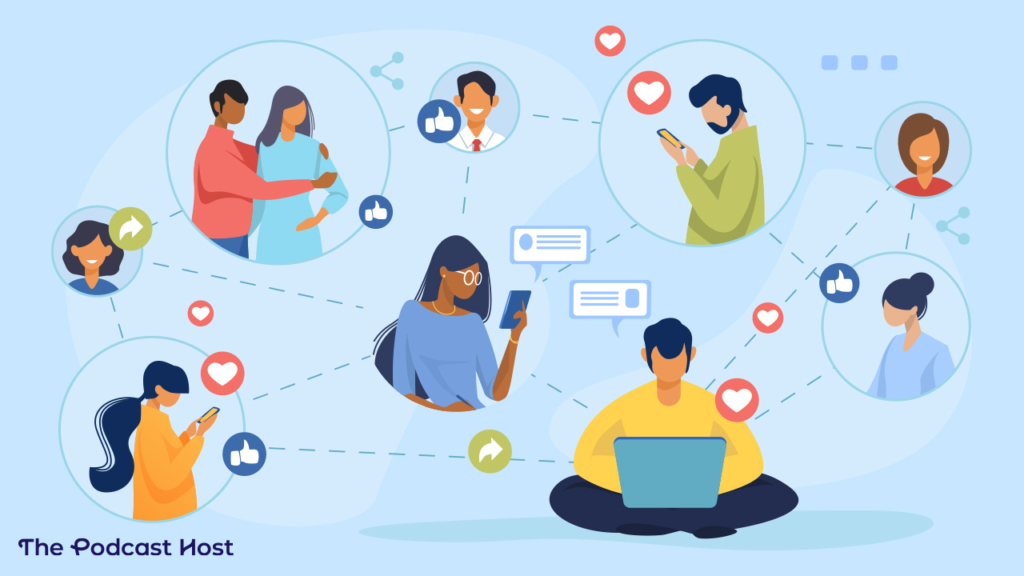
Build Community Inside Your Podcast Content.
Thanking your listeners by name doesn’t cost you a thing. When you get feedback, reviews, or questions, thank the sender by name. This makes the audience feel appreciated and come back for more.
Another way to put your audience in the show meaningfully is to start with a voice feedback survey. Ask questions about your show’s topic, and they can contribute answers. Speakpipe, Tellbee, and other web-based voice recording and transcription services are good ways to let your fans be part of your show.
Live streaming a podcast episode is another great way to get your audience involved in your podcast community. This lets you make video content and repurpose portions for Instagram or YouTube.
Build Podcast Community Outside Your Episode Content
You can be the producer of a thousand people’s favourite podcasts, but unless you give your audience a straightforward route, they won’t get in touch with you.
Build a Home Base for Your Podcast
Yes, you need a website. Many podcasters roll their eyes because it’s extra work. No, making a website doesn’t have to be hard. But, your podcast website helps new listeners find your show. Search engines index websites, not the contents of podcast directories. If someone wants to give you money, how else should they find you?
Most media hosting services include a simple website as part of the package. Podpage is an easy way to make a site, and so is Wix.
Your podcast website needs an email address or a “contact us” form. At the very least, put an email address in your show notes.
Is Social Media a Good Club for Podcasts?
Social media is a good podcast discovery tool, but it’s not great. Your Bluesky, Mastodon, Instagram or Facebook presence can be an avenue for engagement. But, your posts compete with everything else on the platform. Social media sites are meant to hook users and keep them scrolling, not going to another site to listen to your cool podcast. It can help get your show in front of people who might not see it otherwise. However, you should weigh up whether social media negatives outweigh the positives.
Your Podcast’s Community vs Social Media Platforms
You can build a podcast community within social media sites, like a Facebook group or a subreddit discussion group. These are great because they’re meant for discussion. People can easily discover your podcast there, but just as easily scroll on. Again, people will likely spend time on any social media site because they like that specific platform. They’ll enjoy the content you put there, but aren’t likely to follow you off-site without a compelling reason.
Social media marketers use the adage “never build on borrowed land” to caution people about prioritizing their social media presence over buying and making their own websites. If you tried to have a Facebook Live event on Monday October 4, 2021, you probably didn’t enjoy it much. Different social media platforms come and go.
Spammers and trolls thrive on big social media platforms because they’re easy to join and hard to moderate. If you’ve ever been in a Facebook discussion group where suddenly someone interrupted, trying to sell you bitcoin, you know how things can fall apart.
If you create a community group on a platform that anyone can join, have a friction point before people can get into the group. Ask them some relevant questions proving their interest in your podcast’s topic. Make sure they understand your terms and conditions. Otherwise, you can start with lively discussions and end up with spam and fights.
Newsletters for Your Podcast Content
Making a newsletter is one way to avoid the social media doomscroll trap. Who doesn’t love getting emails from their favorite podcast? Start with a call to action in your episodes. Offer your audience something they can only get via email, like a PDF of a favourite recipe, maps, art, or visual assets related to your show. Make something that complements your existing podcast content, that you don’t mind giving away. This gives your audience incentive to sign up. Maintain your email list with an email marketing tool suite to keep it organized with minimal fuss, and protect your audience’s privacy. This way, your relationship with your podcast community can be more direct and personal.
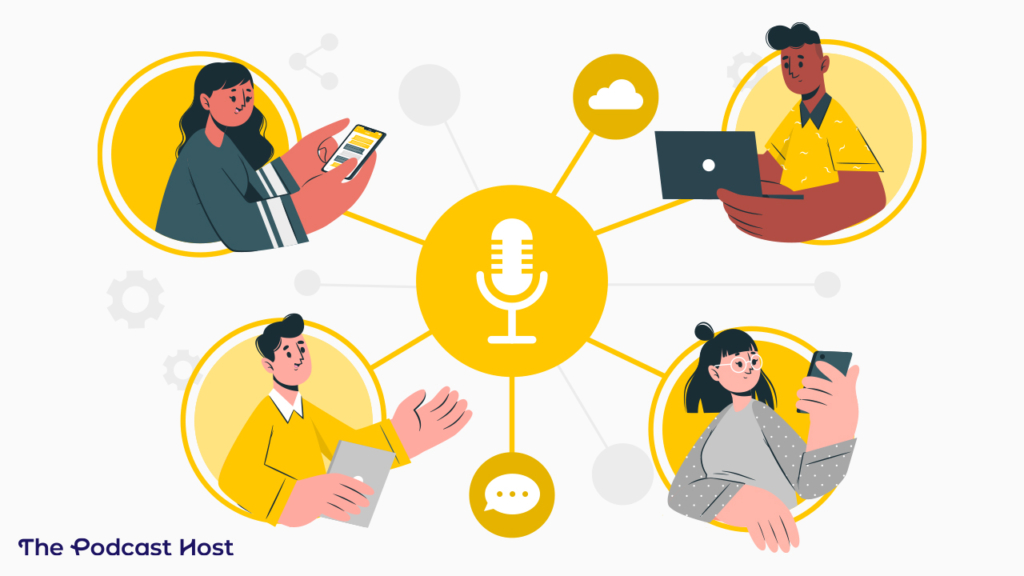
Private Platforms for Your Podcast Community
If you don’t mind more work, you can use a private social media platform.
For example, Discord is an invitation-only, topic-based social media platform with many features. Mostly text-based, it resembles Slack or Internet Relay Chat if you’re old enough to remember it. It’s free, but users can purchase Nitro to upload more data and get special features. Discord has a knowledge base of safety features, training for moderators, and a keyword blocker. The features include text and/or voice chat and a library of app integrations. You can even host live events for your podcast community with Stage Channels.
Circle resembles Facebook circa 2007, without the ads, games, and pokes that made it infamous. You can create subtopic channels, automate welcome messages, and host live events and on-camera discussions within your community. Pricing starts at $39 a month, with a 14-day free trial. But you can monetize community participation. Let’s say, for example, your podcast is about fly fishing. You can have people join the discussion groups for free, but charge admission for the content about how to tie fishing flies.
Running a private podcast community is more work, obviously, than a discussion group on a wider social media platform. Include something in your community that adds value at least once a week, separate from your podcast content. It can be an on-camera demonstration, posting your latest episode, behind-the-scenes content, or whatever you and your audience want to share. Otherwise, there’s little reason for people to keep coming back.
Regarding community moderation, check in at least once daily to see how things are going. Someone who seemed genuinely interested in your podcast community when they joined might forget their manners. One rude person can be a huge turn-off for others and make people stop participating.
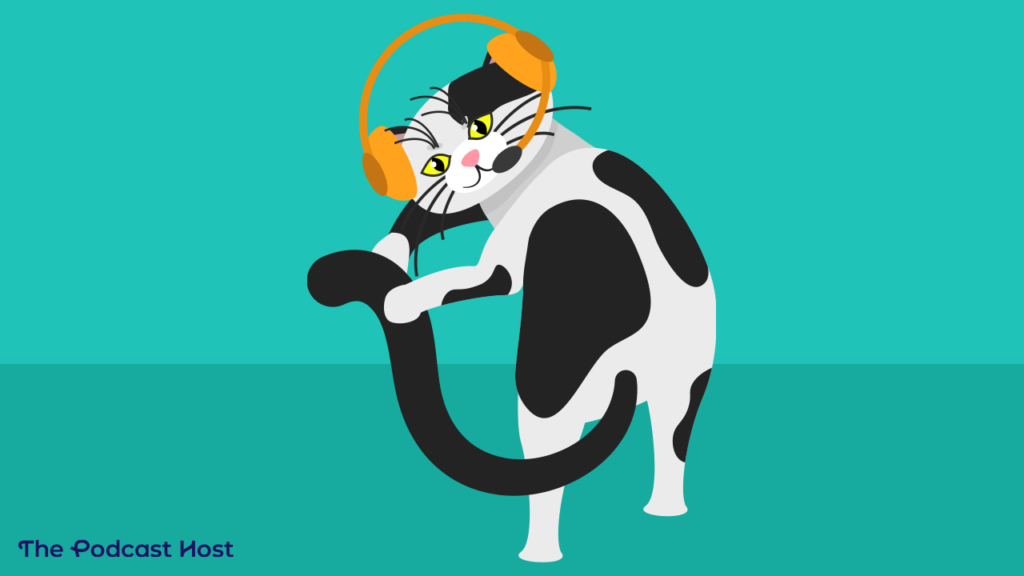
Podcast Community and Parasocial Relationships
Whatever the platform, watch out for any aspect of your community that makes you or your audience uncomfortable. You want your community to be friendly and supportive, generate good word of mouth, and help your show grow. Unfortunately, some people can misunderstand or exploit podcasting community support.
In Mikhaela Nadora’s paper, Parasocial Relationships with Podcast Hosts, she discusses social deixis (how podcast hosts address the entire audience as one important person) and spatial deixis (simulating physical co-presence). These factors create the illusion that the podcast host and listener share an experience.
“Podcast listeners report effects of intimacy, which leads to greater authenticity and conversation practices than radio. When hosts share personal topics, as discussed above, it is considered a sign of intimacy.”
It’s great that podcasts make us feel less lonely. When people in your audience make friends with each other, that’s even better. However, parasocial relationships (a connection where one party thinks they have mutual magnetism and the other doesn’t reciprocate) happen quite a bit in podcasting. They can have dangerous results.
Your podcast community should be a place where you and your audience can be safe. People who are online often (like podcasters) should protect their online activity. Use strong passwords and two-step authentication. Take extra steps to protect your audience’s privacy. When you participate in podcast community events in person, take whatever precautions you need to keep a safety zone around yourself. We can all share ideas and values, but the minute someone makes you or someone else feel uncomfortable, get help.
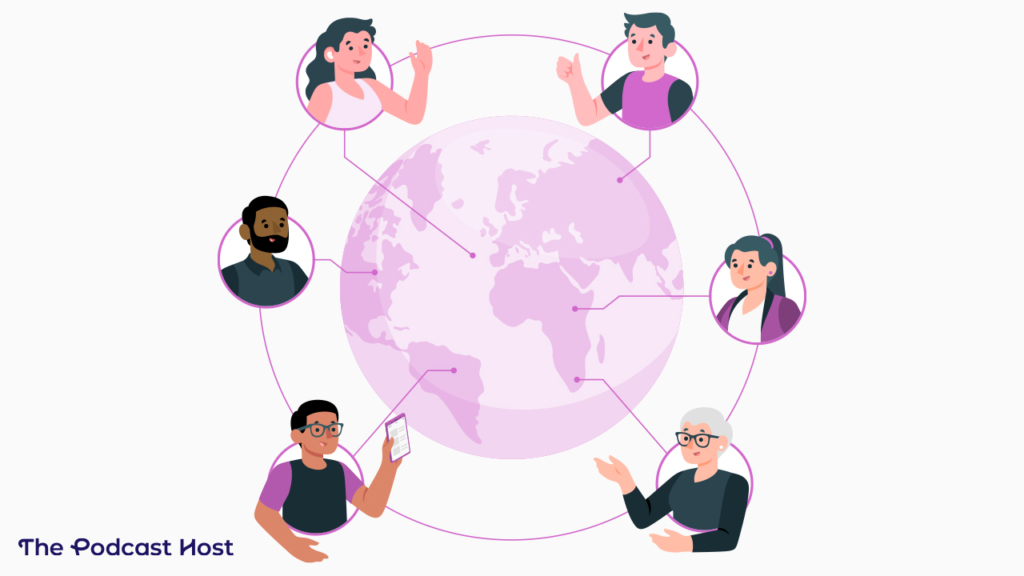
Connecting With the Larger Podcasting Community
There are three ways to connect with your fellow podcasters. One is to go to a park in the morning, find a quiet bench, sit down, and toss handfuls of stale popcorn onto the sidewalk. If you really want to impress the podcast community, bring sunflower seeds.
(Checks notes) I’m sorry. That’s pigeons, not podcasters.
There are two ways to connect with your fellow podcasters: in-person or online. The latter is less work but requires more frequent involvement. The former can be more work and investment in terms of time, travel and money. But it can have a greater impact on your podcast growth.
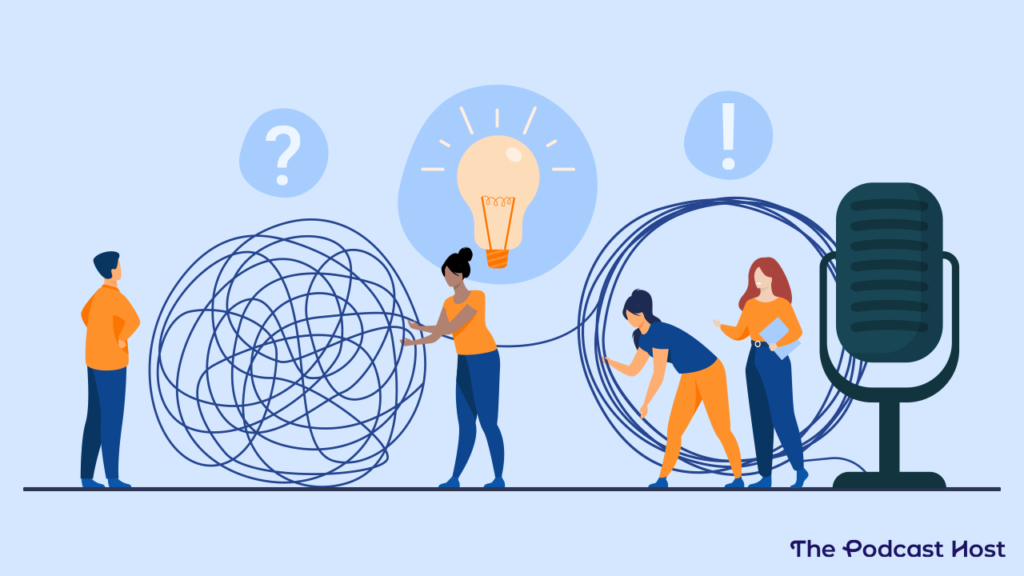
Online Podcast Community: Frequent, Accessible, Low-Impact.
Like the online community you’d create for your audience, there are online communities for podcasters. They’re a good way to get help with obstacles, find shows interested in swapping trailers or interviews, or learn what people think of different products or services based on their experience. Remember, though, they’re not a great place to promote your show. Text-based interaction can make it hard to read social cues, so read the community’s rules and spend some time reading posts, before jumping into discussions.
Facebook Podcasting Communities
These podcast communities are often the easiest to set up and join. Since there are so many, think about what you want to get out of them before you join. Is it specific enough? For example, the Audio Drama Hub is for people interested in making audio drama and fiction podcasts. The Underdog Podcast Community is for independent podcasters. There are Facebook podcast communities for different hosting services, genders, countries, cities, audience sizes, and pretty much any niche you can think of. Moderation and content vary. Most groups have regulations about self-promotion. Otherwise, the podcast community devolves into a chain of posts shouting, “You should listen to my podcast. Here’s a link. Okay, bye.”
Discord Podcasting Communities
When Patreon first started, Discord servers were a feature of many campaigns. So, more often than not, podcast-related Discord communities tend to focus on an individual show. But, Discord communities seem to proliferate like bunnies.
Some Discord communities for podcasters include:
- The WGA Audio Alliance, for fiction podcast writers.
- The Podcasters’ Community – a general podcasting community with dozens of channels for subtopics, almost anything from editing to food.
Anyone can join Discord, but communities are invitation-only. Invitation links can expire based on how the server owner sets their permissions. That said, finding and joining a Discord podcasting community is not hard. If you sign up for almost any podcasting newsletter and read each issue carefully, eventually, you will come across a post promoting a Discord community that you’ll find interesting, with a link.
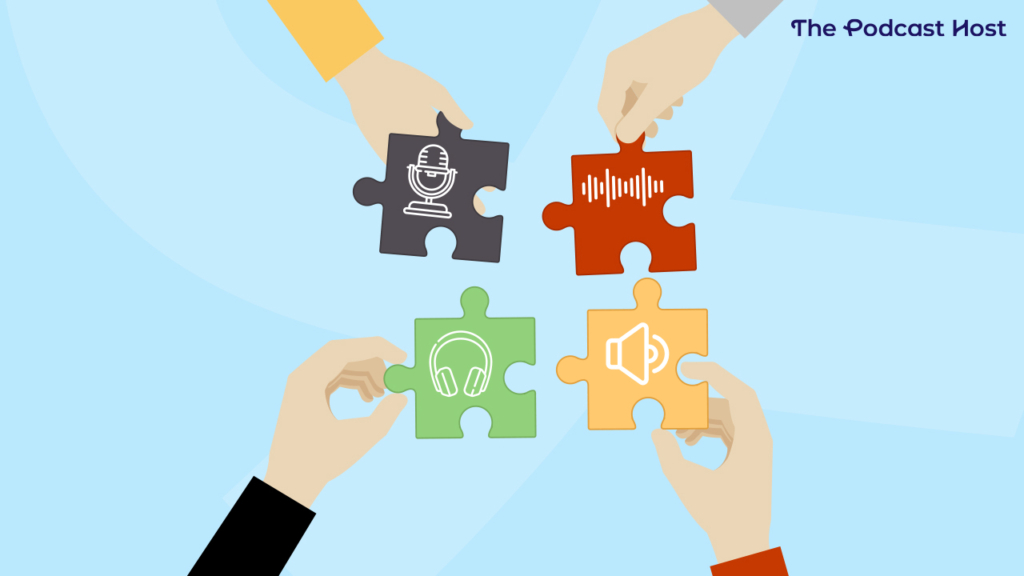
Follow a Podcast About Podcasting and Join Their Community
If it’s not already obvious, where there’s a podcast about podcasting, chances are there’s an online community related to it. For example, we have our PodCraft podcast, and The Indiepod Community. As our Community Manager, Allegra, says, “This community exists to provide a safe space for podcasters to make connections and get the help and encouragement they need to grow their podcasts without the icky sales posts, unreliable information, and post-and-ghost behaviours you see in some other groups. There is none of that here, just useful information and community. We want no podcasters left behind!”
In general, approach online communities with an open mind, pay attention to details, and don’t put your self-promo on blast. A quiet, supportive person needs to show up frequently to make an impact, but they’re more likely to gain followers and invitations. Nobody likes a blowhard. Everybody likes a butterfly.
In-Person Podcast Community: Infrequent, Unusual, High-impact
Podcast conferences, meetups, and mastermind sessions are a great way to meet other podcasters and learn more about your craft. These happen less frequently and require more time, money, and effort. Many of these opportunities have virtual attendance options for those who can’t make that investment. Virtual attendance is great if you want to pay attention to lectures or panel discussions, but you miss out on personal interaction. Here are some important in-person meetups that you should know about. Don’t forget to check our Events page for more.
Podcast Movement
This organization is so big that it’s split into two separate conferences for different needs. Podcast Movement is the annual conference with education, networking, a trade show of different products and technology, and, of course, parties. Podcast Movement Evolutions is a more affordable event meant for podcasters. This event focuses more on education to “directly benefit anyone currently involved with, or looking to get into, podcasting and the podcast industry.” Podcast Movement prides itself on being big, and is not only for podcasters but also for those interested in the industry’s fiscal possibilities.
Podcast Brunch Club
Avid podcast listeners who take their consumption choices very seriously will benefit from Podcast Brunch Club. Producers can benefit from knowing what podcast aficionados prize in a good podcast, but otherwise, this group is audience-specific: “like a book club, but for podcasts.” They have virtual and in-person meetings, and club chapters meet from Shanghai to Santa Cruz.
Their website includes articles and interviews with podcast creators, and their membership shares themed playlists of episodes. Again, this group is for audiences more than it’s for podcasters, but podcast producers can learn a lot from this community’s meetups and content.
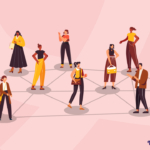
How Successful Creators Build Loyal Communities
Read article called: How Successful Creators Build Loyal CommunitiesPodcast Growth Mastermind
A mastermind is an opportunity to learn from leaders and peers in a particular field or industry. It’s a small-group discussion where experts and laypersons gather for structured discussion and tasks to accomplish a goal. They can be virtual, in-person, or hybrid. Accountability, networking, and inspiration are just some of the benefits. Plus, it sounds like a comic book villain or a board game that your older cousins always beat you at playing on rainy days.
Type the phrase “podcast growth mastermind” into any search engine, and you’ll find dozens, all varying in content, format, price, and quality. These usually have paid admission, a set number of seats, and an attendance policy. Since podcasting is so new (20 years might seem like a long time) and depends so much on virtual content, the leader could be someone with decades of experience in podcasting and related fields, or they could be someone who has made one podcast (if any).
How do you know which podcast growth mastermind to choose? Get the one who has the biggest cranium. They must have a lot of smarts in that noggin!
In all seriousness, find one where the goals align with yours, and they’re familiar with and sympathetic to your topic. Strategy varies for different kinds of podcasts. You wouldn’t ask a golf pro how to cook a hamburger. Well, you might, but you wouldn’t get mad if they weren’t good at it.
Afros & Audio
This podcast community helps Black independent podcasters and audio professionals at every stage of their journey and workflow, from how to start a podcast to networking and educating others. Afros and Audio focus outward (representation in the greater podcast industry, shifting the conversation beyond representation) and inward (creating networks to share resources). Founder Talib Jasir has education and experience in storytelling, wellness and yoga, public policy, and social justice. So, this organization is uniquely poised to make podcasting a tool for people to improve their lives both behind the mic and within the headphones. Their annual conference has almost always been in a Mid-Atlantic city, which makes me have a soft spot in my heart for them.
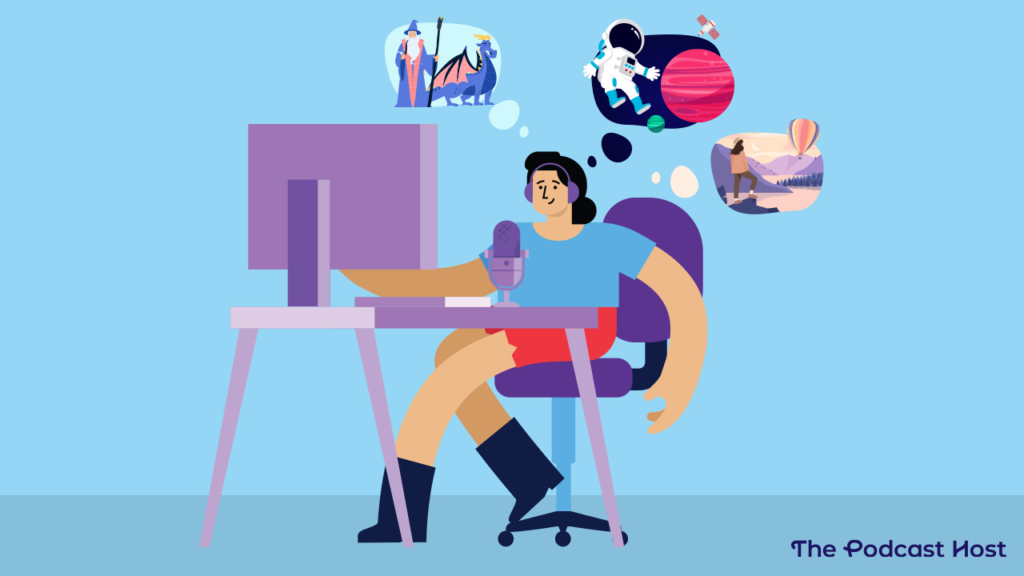
How to Choose The Right In-Person Podcasting Community?
Price, location, and schedule will obviously affect your choices. If all of these factors are equal, check the organizer’s “about” page. Look for a mission statement, or find out what their values are.
For example, hashtagimpact has an altruistic value statement focused on empowering podcasters. At the very least, the “about” page should have a bio that tells you the organizers’ experience and goals. Ask yourself if the language they use feels right for you.
Whether they say things like, “we strive to build a safe space for emerging creatives of diverse experiences to lift their voice,” or “Hack your growth to extreme measures with pros who have skin in the game to take it to the next level and gain l33t status,” you can read between the lines and find a good fit. It never hurts to search for information about the event or organizers separately, to find what others have said about them.
You might have to spend money, time, and effort, but you’re more likely to feel you’re growing in the right direction. Besides, since these events are less frequent, you can commit to different events at different times. The in-person events we mentioned are just a few of the worldwide menu of podcasting meetups, conferences, and events: for more, check our Events page.
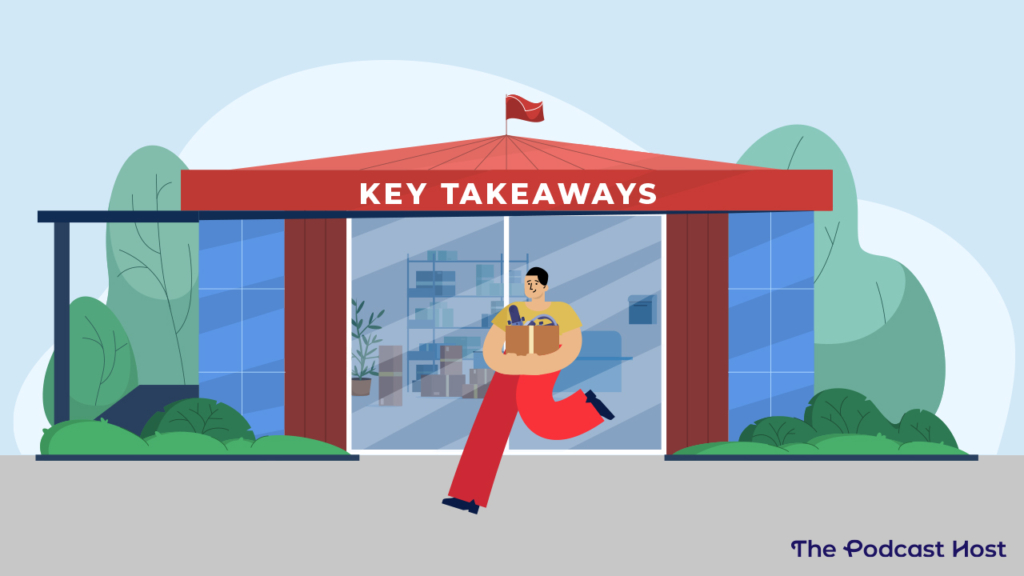
You Can’t Spell Podcast Community Without You and I. Or Taco, For That Matter
This is a massive amount of information to digest. But community is complicated. It’s a multifaceted prism of expectations and behaviours.
Podcasting sharpens what community refracts.
Hey, that’s pretty good. I should put that on some podcast merch.
Building your podcast’s community doesn’t take too much work, provided you intentionally include it in your workflow.
Social media is useful, especially for promoting your show to new people. But it shouldn’t be the only way you interact with your audience. Private channels can be more work, but they make more meaningful connections. Podcasting affects its audience differently than other media, so beware of parasocial relationships. Connecting with the podcasting community worldwide requires different kinds of effort and return. Online engagement should be frequent, focused on support and advice, and less on self-promotion. In-person engagement requires more personal investment, but the rewards exceed your podcast; it can enhance your self-esteem and change you for the better.
What matters most is that you approach your podcast community from a place of gratitude and support. When you thank and help others, over time, you’ll get much more out of your podcasting community than you expected.

